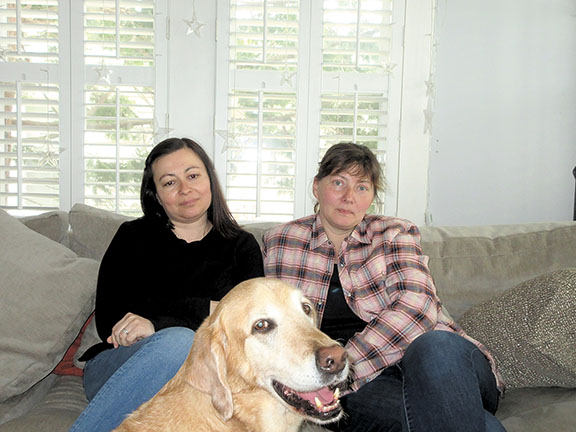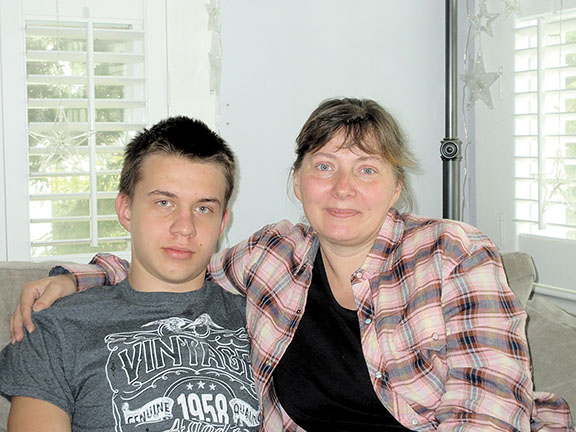
By Stephen Appezzato
FAIR HAVEN – Escaping war-torn Ukraine, a family has found at least temporary refuge with relatives in Fair Haven.
At the onset of Russia’s invasion of their country, Tetiana Yaremchuk, 43, her husband Dimitri Korostii, 42, and their two children, Hlib, 15, and Masha, 6, decided to leave their home in Kyiv for what they thought would be the relative safety of their summer home 20 miles west of the capital. Less than a week later, March 1, as the crisis intensified, Korostii filled the family’s SUV with gas from their other car and Yaremchuk left with the children, heading southwest for the Moldovan border. The imposition of martial law in Ukraine meant Korostii had to stay behind; Ukrainian men ages 18-60 are not permitted to leave the country. Yaremchuk also left the family dog with her husband. “They left when there started to be more and more bombings, and they started to spend more and more time in their basement because there were many sirens and shellings happening nearby. They just thought, if she didn’t take the kids now, they might not have a way to get out,” said Yaremchuk’s Fair Haven host Julie Nagornyi, a nine-year resident of the borough who serves as the family’s translator. While Nagornyi doesn’t speak Ukrainian, she is of Russian descent and both she and Yaremchuk are able to communicate in Russian. Nagornyi’s husband Vlad is Yaremchuk’s nephew.
After 16 hours of driving and an additional five hours spent crossing the border, Yaremchuk, Hlib and Masha arrived in Moldova where they could finally rest for a night with friends.
“As they were driving, many military vehicles were passing them; they were going towards Kyiv,” Nagornyi said. Along the way they passed many signs warning of landmines.
From Moldova, the three took an 11-hour bus ride to Bucharest, Romania, where they boarded a flight to JFK airport, New York. After four days of near constant travel, Tetiana, Hlib and Masha finally landed in the United States, where the Nagornyi family anxiously waited.
Yaremchuk and her children were only able to bring one suitcase with them, so upon their arrival in Fair Haven, Nagornyi posted a request for donations on Facebook.
“When Tetiana got here, we just wanted to do as much as we could, because we just felt so helpless. We were very grateful that they were here, and they were safe, but it just didn’t feel like enough, like we needed to do more,” Nagornyi said. Her Facebook post reaped a welcome flood of support from members of the Peninsula (Rumson, Fair Haven and Little Silver) community, who donated many items, including clothing and toys, for the family.
“I was overwhelmed and humbled because it’s very emotional for us, obviously, but just to see that people care so much and they want to help, you know? I get so many messages on Facebook asking how people can help, and it’s just amazing,” Nagornyi said. Hlib and Masha were also warmly welcomed into the local school system. Hlib attends school with Nagornyi’s two children, Daniel, 18, and Timothy, 15.

Inspired by the generosity of local donations, the Nagornyis and Yaremchuk wished to help other families facing similar hard ships, passing donations along to collection efforts in New Brunswick. Goods are then shipped to Eastern Europe to provide aid.
“Every day is different. It feels like it’s been a year at least – I always say March has been the longest year. We don’t know what tomorrow will be,” Nagornyi said.
For now, Yaremchuk and her children are technically visitors in the United States and do not have formal refugee status, creating uncertainty for their future. Because of this, Yaremchuk, who was an accountant in Kyiv, has not been able to work.
“We’re waiting impatiently to see what will happen, so we can have some assurance in tomorrow, because we don’t know what’s going to happen,” she said.
Yaremchuk said she wants her husband to come to the United States to reunite with his family. However, she is unsure if that will be possible, as Korostii is still sheltering in their family’s summer home located near ongoing fighting. They try to contact each other whenever possible, but communication is difficult and often dangerous. As a result of the conflict, the town where he is located lost power. “It (the power infrastructure) has been destroyed by the fighting, and they’re not able to repair it because as soon as a repairman gets there, there’s more fighting,” Yaremchuk said. To communicate with his wife, Korostii, an engineer, must trek up a hill to reach 3G cellular service, a hazardous task in a conflict zone. “My biggest dream is for the war to be over,” Yaremchuk said. “I think it’s all Ukrainian peoples’ dream.” Nagornyi said she is deeply affected by watching coverage of the war on television. “For the first time, I felt that I was living the news and it was something I never ever experienced in my life,” she explained, even after watching all the coverage of the pandemic. Both Nagornyi and Yaremchuk expressed the importance of raising awareness about the war and continuing to send aid to Ukrainian refugees. “Unless people realize that it’s so close to home now, that there is a person here, that it’s more than TV, it’s not as real,” Nagornyi explained. “It’s important for me that people realize that it’s closer than you think, and that it can happen to anybody. Because until Feb. 24, I did not believe that this was happening or it would actually be like this.”
This article originally appeared in the March 31, 2022 print edition of The Two River Times.














